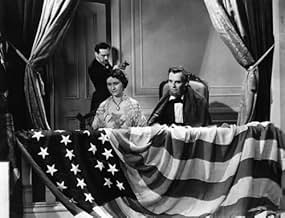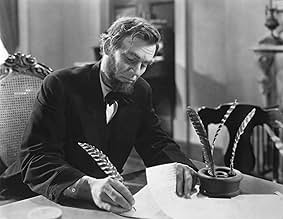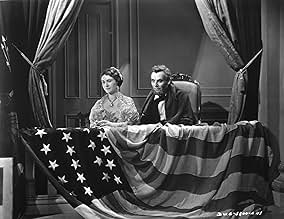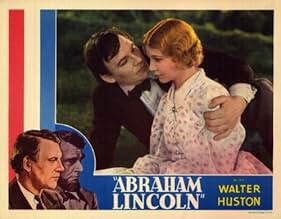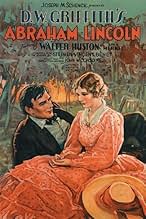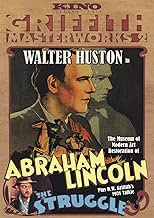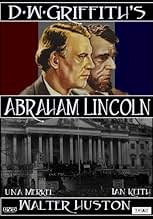VALUTAZIONE IMDb
5,6/10
1760
LA TUA VALUTAZIONE
Aggiungi una trama nella tua linguaAn episodic biography of the 16th President of the United States.An episodic biography of the 16th President of the United States.An episodic biography of the 16th President of the United States.
William L. Thorne
- Tom Lincoln
- (as W.L. Thorne)
Edgar Dearing
- Armstrong
- (as Edgar Deering)
Jason Robards Sr.
- Herndon
- (as Jason Robards)
Cameron Prud'Homme
- John Hay - Secretary to the President
- (as Cameron Prudhomme)
James Eagles
- Young Soldier
- (as Jimmie Eagle)
Trama
Lo sapevi?
- QuizThis was D.W. Griffith's first sound film. Il cavaliere della libertà (1930) was also the first sound film about the Civil War which veterans of that war could view.
- BlooperIn both the Union and Confederate parades, the musicians play trombones with forward facing bells. During the Civil War, the bells faced backwards.
- Citazioni
[death scene]
Ann Rutledge: I know the truth, dear. It's goodbye.
Abraham Lincoln: No, no, Ann, dear. You're not going to leave me. I won't let you!
Ann Rutledge: We must be brave, dear...
[looking up to the heavens]
Ann Rutledge: Don't take me away. Don't take me away! It's so dark and lonesome!
Abraham Lincoln: Ann, you mustn't let go.
Ann Rutledge: If they'd sing, I wouldn't be so afraid.
[a chorus of "Sweet By and By" swells up in the background]
Ann Rutledge: We will meet there, dear.
- Versioni alternativeOriginally, this film was color-tinted in sepia-tone, with blue for night scenes. These prints also had a prologue. Current public-domain prints are in black and white, minus the prologue with a shorter running time.
- ConnessioniEdited into General Spanky (1936)
- Colonne sonoreBattle Hymn of the Republic
(ca 1856) (uncredited)
Music by William Steffe
Lyrics by Julia Ward Howe (1862)
Played during the opening credits and often in the score
Sung by an offscreen chorus during a civil war scene
Recensione in evidenza
If Griffith had stuck to Lincoln's personal life, this could have been an interesting, amusing, and occasionally insightful film. Griffith gives us a multi-layered and largely accurate portrait of Lincoln the man. We see the ungainly country lawyer, countrified in speech and manner, often serious, even melancholy, but with a rare ability to find humor in the most unlikely places and to laugh even at himself. We see Lincoln the inveterate story-teller, the insomniac, the doting father, the determined commander-in-chief the patient husband. If this had been the whole of the film, it would have been easy to overlook its painfully outdated style and to forgive its frequent omissions and exaggerations as poetic license.
Unfortunately, the film necessarily includes Lincoln's political life, and here it moves from poetic license to outright falsehood. Slavery was the central issue of Lincoln's political career, a fact that Griffith tries to obscure, going so far as to turn Lincoln's pivotal 'House Divided' speech into an argument against secession. This is particularly ironic since it was really Lincoln's battle cry against encroaching slavery. When South Carolinians seceded two years later, this was the speech they pointed to as proof that when Lincoln took office, "the slaveholding States will no longer have the power of self-government ... and the Federal Government will have become their enemy."
During Lincoln's presidency, the question of slavery occupied much of his time and attention, yet again Griffith chooses to ignore it. His Lincoln spends more time admiring the courage of Confederate soldiers than worrying about slavery. Even the Emancipation Proclamation gets only the briefest attention. Lincoln reads a line from the document, signs it, and says, "Well, gentlemen, it is done." It's oddly dismissive, coming from a man who considered emancipation the central act of his presidency and the most meaningful act of his life.
Denied his opposition to slavery and concomitant commitment to democracy and the inalienable rights of man, Lincoln is reduced to endlessly repeating, "The Union must be preserved." Why it must be preserved is left to the audience's imagination. The film never gives us the slightest clue.
Unfortunately, the film necessarily includes Lincoln's political life, and here it moves from poetic license to outright falsehood. Slavery was the central issue of Lincoln's political career, a fact that Griffith tries to obscure, going so far as to turn Lincoln's pivotal 'House Divided' speech into an argument against secession. This is particularly ironic since it was really Lincoln's battle cry against encroaching slavery. When South Carolinians seceded two years later, this was the speech they pointed to as proof that when Lincoln took office, "the slaveholding States will no longer have the power of self-government ... and the Federal Government will have become their enemy."
During Lincoln's presidency, the question of slavery occupied much of his time and attention, yet again Griffith chooses to ignore it. His Lincoln spends more time admiring the courage of Confederate soldiers than worrying about slavery. Even the Emancipation Proclamation gets only the briefest attention. Lincoln reads a line from the document, signs it, and says, "Well, gentlemen, it is done." It's oddly dismissive, coming from a man who considered emancipation the central act of his presidency and the most meaningful act of his life.
Denied his opposition to slavery and concomitant commitment to democracy and the inalienable rights of man, Lincoln is reduced to endlessly repeating, "The Union must be preserved." Why it must be preserved is left to the audience's imagination. The film never gives us the slightest clue.
I più visti
Accedi per valutare e creare un elenco di titoli salvati per ottenere consigli personalizzati
- How long is Abraham Lincoln?Powered by Alexa
Dettagli
- Tempo di esecuzione1 ora 36 minuti
- Colore
- Proporzioni
- 1.20 : 1
Contribuisci a questa pagina
Suggerisci una modifica o aggiungi i contenuti mancanti

Divario superiore
By what name was Il cavaliere della libertà (1930) officially released in India in English?
Rispondi
